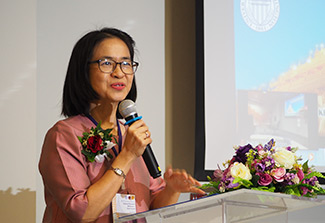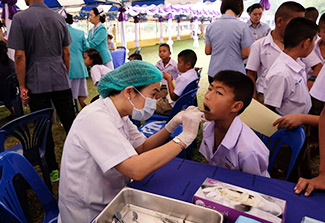Cultivating oral health research within and beyond Thailand’s borders
January/ February 2023 | Volume 22 Number 1

Waranuch Pitiphat, Dean and Associate Professor at Khon Kaen University in Thailand, also serves on the Board of Directors of the DeRouen Center for Global Oral Health at the University of Washington in Seattle. She earned her DDS from Chulalongkorn University, MPHM from Mahidol University, followed by a MSc and ScD in Epidemiology from Harvard University. Dr. Pitiphat is a former president of the Thai Society of Public Health Dentistry and the Asian Academy of Preventive Dentistry, former Honorary Secretary of the Southeast Asia Association for Dental Education, and executive member of Thailand’s Royal College of Dental Surgeons and the Thai Dental Council. She has authored more than 80 papers published in peer-reviewed journals and serves as editorial board member for several reputable journals.
Why did you become a dentist and a researcher?
Dentistry is one of the professions that helps people. We do good deeds every day we work. I started at Khon Kaen University in the Community Dentistry Department, where we conducted research in the field, and this included providing dental treatment to villagers. As I became more aware of dental public health, I wanted to learn more about epidemiology and biostatistics. Epidemiology is very exciting. I felt like a detective trying to find the causes of disease. Conducting clinical and epidemiological research, I combine my wish to help people with my love for biostatistics and epidemiology.
I also serve as a facilitator, helping others in Southeast Asia gain opportunities to do research in their own country with mentorship from the U.S. and Thailand. Due to my professional positions, I know most dental schools in my region. I know what they need and how they can improve. Not many people have had the good fortune I’ve had to study epidemiology and oral health in the U.S., so I want to extend the same opportunity to others.
Tell us about your early research.
At Harvard my thesis looked at whether periodontitis, a disease in which the gums can pull away from the tooth, is a risk factor for adverse pregnancy outcomes. At that time, researchers had just begun to explore associations between oral health and general health and there were a few North American studies examining periodontal disease in relation to adverse pregnancy outcomes. Some studies found women with periodontal disease have higher risk for premature or low-birth weight babies compared to those without disease. However, most of these studies were conducted in minority, low-income or teenage pregnancy cohorts. We wondered if the same association existed among middle- and high- income or white populations. With a small grant from the National Institute of Dental and Craniofacial Research (NIDCR), we attached our study to Project Viva, a birth cohort study led by Dr. Matthew Gillman. We found the same association between periodontitis and adverse pregnancy outcomes in a white, high socioeconomic population.
When I returned to Thailand, we conducted similar studies there and in Vietnam and found the same pattern of association. In one study, we screened pregnant women for periodontal disease and treated those who needed it. While this didn’t reduce the preterm birth rate significantly, it improved the women’s oral health. The evidence from these studies forms the basis for the inclusion of oral health screening and periodontal treatment as a part of universal health care for pregnant women in Thailand.
What are you working on now?
My current project continues the work of Dr. Timothy DeRouen of the University of Washington in Seattle, who began to build capacity for oral health research in Thailand in 2006. Over the years, he partnered with me at Khon Kaen University and others to provide research training for dentists first in Thailand and then other Southeast Asian countries. Over 15 years and three Fogarty grants, we have educated almost 300 trainees.
Today I am principal investigator (PI) for the same program (funded mainly by NIDCR). To sustain research within the region, we are building and utilizing a network of our own and have created a training program with five levels. The first level is an annual five-day workshop on clinical research methods conducted in the Southeast Asian region. It’s similar to what we’ve done in the past, but we’ve added e-modules of background material for the trainees and the courses are taught mainly by lecturers from our own region, with some help from the U.S. The second level takes place at the University of Washington and consists of their long-standing Summer Institute in Clinical Research Methods. Due to COVID-19, we’ve been conducting this online for the past couple of years, but this March we’ll send participants to gain additional experience in Seattle. The third level is a four-month training program in research methodology and biostatistics offered annually at Khon Kaen University in Thailand. The fourth level provides each dentist-trainee with an opportunity to do non-degree research in their own country. Each has one local mentor, one mentor in Thailand and one mentor in the U.S., which gives them a chance to work internationally and improve their knowledge of research… and English! The final level supports dentists from Southeast Asia to pursue a doctorate in Oral Sciences in Thailand.
We will also organize networking events and conferences so that our trainees can meet like-minded scientists and participate on the international stage. We want to help trainees forge partnerships to conduct future research together.
 Photo credit: Waranuch Pitiphat
Dr. Waranuch Pitiphat provides dental care to a child. The prevalence of dental caries (tooth decay) in early childhood is as high as 80% in Cambodia, according to estimates
Photo credit: Waranuch Pitiphat
Dr. Waranuch Pitiphat provides dental care to a child. The prevalence of dental caries (tooth decay) in early childhood is as high as 80% in Cambodia, according to estimates
Why is regional oral health research so important?
Oral health research is very young in Southeast Asia. With a population of over 650 million, our region is very large and very diverse, with different ethnicities, cultures and religions—including Islam, Christianity and Buddhism—among and within countries. We need region-relevant and country-specific research so that we can provide appropriate public health programs and plan prevention and treatment strategies for our populations.
For example, we know that the prevalence of dental caries (tooth decay) in early childhood is very high in our region—as high as 80% in Cambodia, according to estimates. But we don’t know much about the magnitude or the epidemiology of the problem. In Thailand, we hypothesize that globalization, leading to towards more Western-style diet and increased sugary snack consumption, may be a contributing factor. Industrialization leading to urban migration of workforce means that young parents often leave their infants and little children with their grandparents in rural areas. Grandparents often lack knowledge about diet and oral health, so they give the children sweets without teaching them proper oral hygiene.
Are you planning any other projects?
We are working on several oral health problems and trying to work with other countries in the region. In Thailand, we conducted a cohort study in infants to investigate the association of prolonged breastfeeding and early childhood caries. We also expanded the study to identify microbial biomarkers for the prediction of future caries using the salivary microbiome (the community of microorganisms, such as fungi, bacteria and viruses, that exists in the saliva). In the Philippines, we are conducting a study on caries risk assessment and evaluation of the risk factors for early childhood caries. We’ll be starting some work in Cambodia soon. We also have projects in Thailand and Vietnam focused on cleft lips and cleft palates. At the Cleft Center, we have begun epidemiology research to find risk factors and interventional research for new innovations developed in our region. We’re also conducting clinical trials addressing various issues including the treatment of orofacial (oral and facial) pain. Geriatric patients are increasing in Southeast Asia and orofacial pain affects that population.
More Information
Updated February 13, 2023
To view Adobe PDF files,
download current, free accessible plug-ins from Adobe's website.
Related Fogarty Programs
Related World Regions / Countries
Related Global Health Research Topics